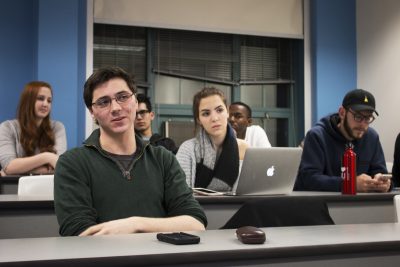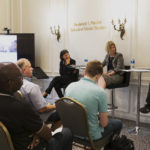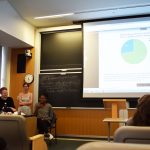
Approximately 20 students gathered in the College of Arts and Sciences Wednesday night for a discussion on the Israeli-Palestinian conflict hosted by the Boston University International Affairs Association.
The discussion focused on the United Nations Security Council’s December decision to oppose the legal validity of Israeli settlements in Palestine.
Louise Carbery, a senior in CAS and vice president of BUIAA, said BUIAA hoped to provide a respectful environment where students could share their opinions on the conflict, gain a better understanding of the background of the conflict and learn about current events surrounding the region.
“This can be an emotional topic, anything involving identity politics is,” Carbery said before the discussion. “I hope to provide a respectful forum for students no matter what they believe.”
She said it’s especially important to have respectful discussions when considering such a polarizing issue.
“I hope students come out not only with a greater understanding of the background of [the] Israeli-Palestinian conflict and the UNSC, but also an understanding of the different narratives around campus regarding the conflict,” Carbery said.
Carbery posed three questions to the group. She asked students to consider how the new Trump administration would affect the application of the decision, how the international community’s response will shape the future of the conflict and what methods to create peace will be effective in solving geopolitical conflicts.
Much of the conversation centered around the involvement of the United States in the conflict, or its lack thereof.
Jessica Mansur, a junior in CAS, said she thought one reason why the United States abstained from taking a position on the issue was to avoid breaking its alliance with Israel.
“This is a hot topic — it’s really hard for people,” Mansur said. “We all come from very different backgrounds … but we were able to go back and forth about it and challenge each other, and it never crossed that line.”
Victoria Reynolds, a senior in CAS, said the United States’ abstention acted as a signal to the world.
“I don’t think alliances should be blind, whatever it is you’re doing, it’s fine,” Reynolds said. “Israel’s absolutely overstepped in lots of areas.”
Carbery concluded the discussion by focusing on the future of Jerusalem.
“This isn’t a conflict of good guys or bad guys; no cultural conflict ever has been,” Carbery said. “There’s a ton of uncertainty with the status quo, and the only thing that we know is that there is going to be change, and I can only hope that it is going to be positive.”
Several students in attendance said they were impressed by the discussion.
Anushka Pinto, a senior in CAS, said she was impressed to hear the variety of perspectives that were expressed.
“I think overall it was a very constructive dialogue,” Pinto said. “I’m very impressed at how peaceful it remained. There was not really any aggression towards one another despite the fact that there were differing opinions.”
Desmond Molloy, a sophomore in the Sargent College of Health and Rehabilitation Sciences, said the conversation was less antagonistic than he thought it would be.
“I’ve seen a lot of unpleasantness around on this campus in particular around the Israeli-Palestinian question, but I thought it went much more in depth than I expected,” Molloy said.
Zachary Thomas, a junior in the Frederick S. Pardee School of Global Studies, said he noticed tension during the discussion, although it was still a respectful conversation.
“As always with a discussion like this, you can feel the tension,” Thomas said. “I always feel like people don’t say what they want to say, or are able to say everything they want to say for fear of offending people … but it was pretty good overall.”




